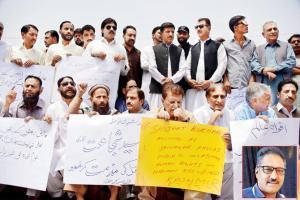Rising Kashmir editor Shujaat Bukhari's assassination harks back to turbulent '90s and the targeted killing of peacemakers in the Valley

Journalists and residents protest the killing of Shujaat Bukhari (inset), in Muzaffarabad, the capital of Pakistan-controlled Kashmir, on June 15. Pic/AFP
 The assassination of Shujaat Bukhari and the release of the United Nations High Commissioner for Human Rights' report on Kashmir both happened on Thursday, and it was déjà vu: the 1990s all over again.
The assassination of Shujaat Bukhari and the release of the United Nations High Commissioner for Human Rights' report on Kashmir both happened on Thursday, and it was déjà vu: the 1990s all over again.
Shujaat was the editor of Rising Kashmir, an independent newspaper: he was a gentle soul, a gem of a person who threatened no one. He was an asset to his society. His killing makes no sense. He and his two guards were shot dead at Srinagar's Press Enclave. It was a targeted killing the likes of which we saw in the 1990s, of peacemakers like Mirwaiz Maulvi Farooq and Dr AA Guru. The entire Valley plunged into shock. It happened two days before Eid but Kashmiris have learnt to expect death around every corner. Shujaat leaves behind a widow and two children, a shell-shocked journalists' fraternity, and a homeland that sees no hope, only despair.
ADVERTISEMENT
The UN's damning report covered June 2016 to April 2018, roughly from when Burhan Wani, a charismatic Hizb militant, was killed by security forces. It states: "In responding to demonstrations that started in July 2016, Indian security forces used excessive force that led to unlawful killings and a very high number of injuries... Civil society estimates are that 130 to 145 civilians were killed by security forces between mid-July 2016 and end-march 2018, and 16 to 20 civilians killed by armed groups in the same period." The grief over Shujaat will fade in time; the words in this report are on record forever.
The report is basically the world telling India one thing: Your hardline policy does not work. It recommended a Commission of Inquiry to investigate human rights abuses in J&K. To New Delhi it made 17 recommendations, from broad ones such as respecting international law obligations in J&K, to specific ones such as repealing AFSPA (Armed Forces Special Powers Act).
Instead of introspecting on its treatment of its citizens, the government reacted petulantly and dismissed the report as fallacious and motivated. It quibbled on semantics, and resorted to ad hominem attacks. Depressingly, the Congress party followed suit. Naturally, since it bears responsibility for creating the mess in Kashmir.
In the 1990s, such reports made India anxious. In 1994, Prime Minister PV Narasimha Rao sent the Leader of Opposition, AB Vajpayee, with a delegation to the UN Human Rights Commission in Geneva to defend India's case. It worked. Narendra Modi is different: he believes India no longer needs to worry about international opinion; and forget about the Opposition, he doesn't even trust Cabinet colleagues to important assignments.
Modi must be worried, though: the report is hard evidence that his policy on Kashmir over the past four years is superficial and has failed. It is a policy of beating Kashmiris into the ground, into submission. It normalises excessive force. It labels each Muslim as anti-national or an "overground terrorist". It holds no value for the individual's life, liberty or pursuit of happiness.
In 2015, BJP general secretary Ram Madhav enunciated his party's policy following a newspaper report in which former Research and Analysis Wing (RAW) chief AS Dulat — a known votary of talks in Kashmir, and also the co-author with myself and former ISI chief Asad Durrani of The Spy Chronicles: RAW, ISI and the Illusion of Peace — had called on the government to draw the separatist All Parties Hurriyat Conference into talks. Madhav candidly said that other policies had been tried and had failed, and now that his party was in power, it would try things its way. Fair enough. The BJP won a parliamentary majority and was entitled to implement its ideological belief as once enunciated to me by a former editor and party ex-MP: "Every last Kashmiri may die, but that land must remain ours".
National Security Advisor Ajit Doval has stated that Pakistan was to be removed as an option for Kashmiris so that they would face just one choice: India. This has not worked. Shujaat was in Delhi for the launch of The Spy Chronicles, and during the panel discussion, he stood and told former chief minister Farooq Abdullah: "Kashmiris born after 1990 have grown up under the barrel of the gun. They hate India." So much for Doval's doctrine. Kashmiris have proved that the human spirit cannot be locked into a zero-sum game.
Shujaat was a moderate who wanted peace and dialogue. We may never learn who ordered his killing, but it further eroded the middle ground in Kashmir. Shujaat himself said that if moderates are made irrelevant, Delhi will have only the terrorists left to deal with. This possibly suits the BJP, whose approach in all aspects of polity is to kill the middle. The result is that today, into the fifth year of Modi's reign, we have regressed 25 years in Kashmir.
Aditya's latest book, The Spy Chronicles: RAW, ISI and the Illusion of Peace, co-written with AS Dulat and Asad Durrani, is now available.He tweets @autumnshade Send your feedback to mailbag@mid-day.com
Catch up on all the latest Mumbai news, crime news, current affairs, and also a complete guide on Mumbai from food to things to do and events across the city here. Also download the new mid-day Android and iOS apps to get latest updates
 Subscribe today by clicking the link and stay updated with the latest news!" Click here!
Subscribe today by clicking the link and stay updated with the latest news!" Click here!







